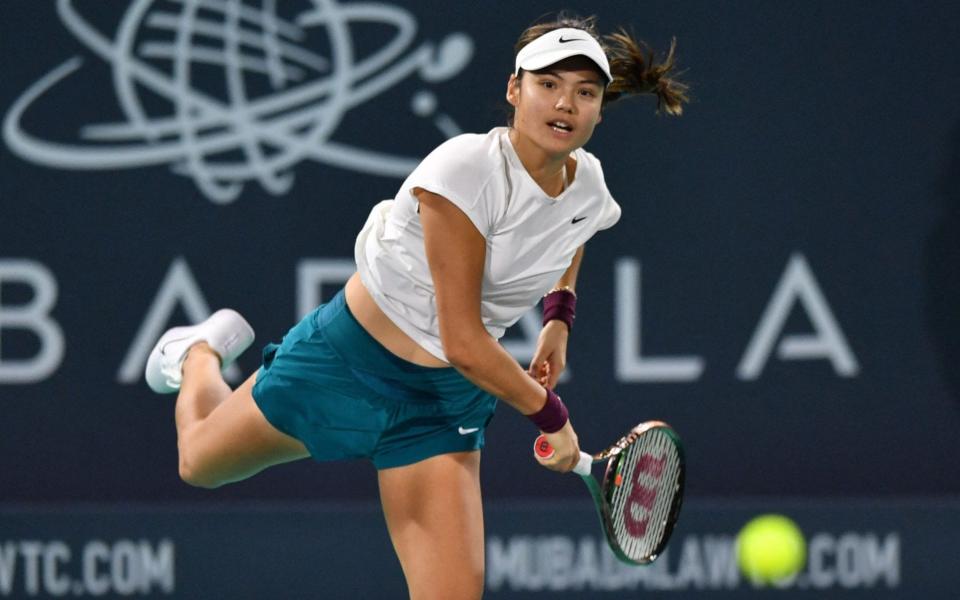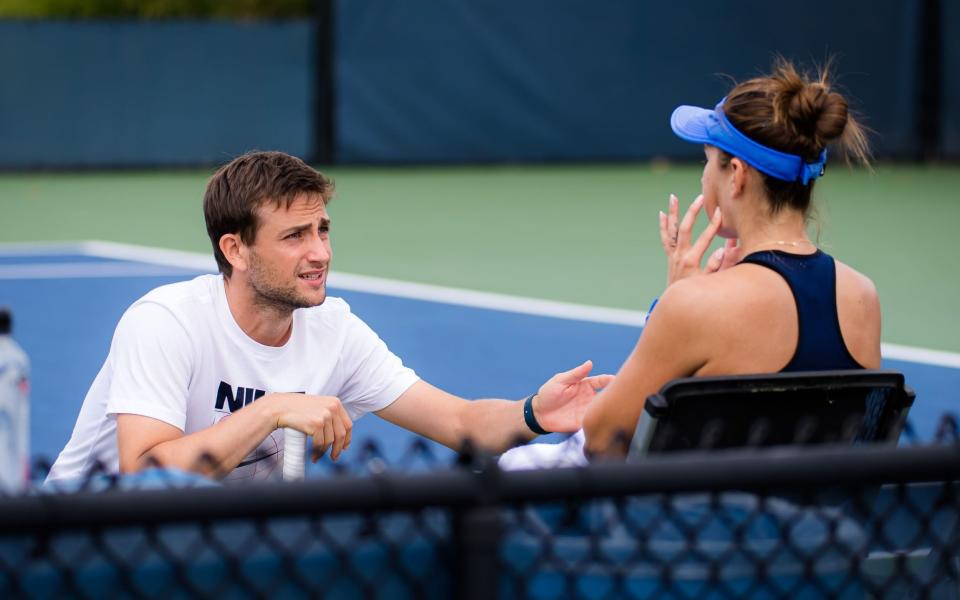Why Emma Raducanu's left-field coach choice could be an inspired move

Sebastian Sachs represents a smart choice of coach for Emma Raducanu, according to Germany’s head of women’s tennis Barbara Rittner, who hopes that Sachs will be given enough time to apply his talent.
At just 30-years-old, Stuttgart’s Sachs is still relatively unknown beyond the immediate circle of the players he has worked with – namely Olympic champion Belinda Bencic, double Australian Open champion Victoria Azarenka and former German No1 Julia Georges.
But Rittner has seen plenty of coaches come and go (as, notoriously, has Raducanu), and she believes Sachs has something special.
“I met Basti seven or eight years ago in Stuttgart, and I asked him to be a hitting partner for my younger girls,” Rittner told Telegraph Sport. “He turned out to be perfect. He was a very talented junior who never made it on the main tour, so if you tell him ‘Okay, play as good as you can’, they wouldn't have a chance. But he could find the right range for each player so that it was a close match.
“Basti is a really down-to-earth nice guy,” Rittner added. “All the girls liked him a lot. He's got a good eye for footwork and technique all together. And for his young age, he's already very experienced. He is very demanding on keeping the focus and I think he's a great choice for Emma. I just hope that he gets a little more time than the other coaches had. And because also I think Torben Beltz [another German coach who began a five-month stint with Raducanu just over a year ago] was doing a good job. Emma just has to focus maybe more on tennis a bit and just stick to one coach.”
Sachs’s own playing career was undistinguished. He reached a high point of No1,052 in the world rankings and appeared in 40-odd entry-level Futures events between 2009 and 2015 without ever going past the quarter-finals.
But he quickly parlayed Rittner’s invitation to train with Germany’s best juniors into a burgeoning career. The stepping stone was a Fed Cup tie in Leipzig in February 2016, six months after his last appearance on the Futures tour.

“I remember that Angie Kerber [the German No 1 and then world No 2] had just won the Australian Open,” Rittner recalled. “I wanted to have a strong hitting partner because we were playing Switzerland and they had Bencic and Martina Hingis and Timea Bacsinszky. So he was there, and Bencic’s dad called me afterwards to see if I would have a problem asking Basti to be Belinda’s hitting coach.
“So that was actually when he started his coaching career for real: with the Hingis mother, Melanie Molitor [who was Bencic’s coach], and Belinda’s dad. And then he found his way – he was very, very eager to gain experience. He spent some time at different academies: the Nadal Academy in Mallorca, Riccardo Piatti’s Academy in Italy. You can see that he has a huge passion for tennis, and Emma is lucky to have him.”
Sachs fills two roles, as he is such a quality hitter that he can be a sparring partner as well as a coach.
Andrea Petkovic, the former world No 9 who was part of the German team for in Leipzig, did not hit with Sachs that weekend as he was reserved for Kerber’s practice sessions. But she agrees with Rittner that this is a canny signing.
“It’s really important to have a coach that can also play with you,” said Petkovic. “First of all, it helps the coach to get a better feel for your game and where you can improve. And then, if you are out of rhythm, it’s nice to have somebody that is on your team and on your side to hit with you [as opposed to a rival player].
“Also, the way he plays is kind of like a woman. I hope he doesn't read this piece but what I'm trying to say is that he can flatten out the ball really well to imitate a woman's game, compared to other male hitting partners who have have a lot of topspin in in their strokes. They make it harder for women to play with them and to get used to the type of tennis that women play.
“Finally, what I think is great with Basti is that he's a very earnest person, very ambitious and very diligent. He really improves as a coach all the time. You can see that he's gained quality and gained some experience on tour, and I think he really knows what he's doing. He's a very amicable guy, so you get along with him very easily. That's a huge thing that people sometimes forget, but it plays a big part in coaching and tennis. You spend so much time together and far away from home under high-pressure situations.”
As Petkovic suggests, there is more to Sachs than a decent forehand. Raducanu’s representatives are understood to have been impressed with his methodical approach, plus his interest in data and analytics.
Raducanu herself likes to have a lot of information at her disposal, considering her brain to be as powerful an asset as her athleticism, and is prone to quizzing her coaches closely in post-match debriefs.
She has been strangely reluctant to develop a long-term alliance with any one coach, having previously worked with Nigel Sears, Andrew Richardson, Beltz and Dimitry Tursunov over the past 18 months. But if Sachs can meet her lofty expectations, he has the chops to grow into a long-term mentor. In which case, this apparently left-field choice could yet prove to be an inspired pick.

